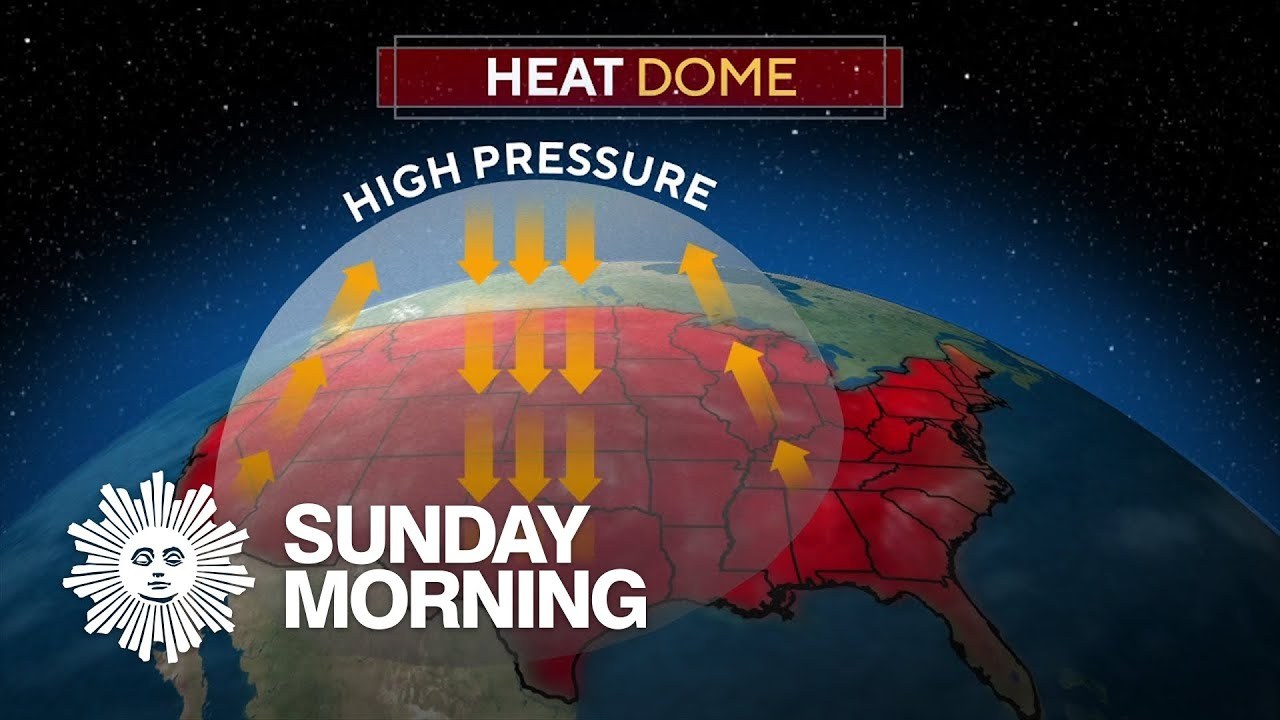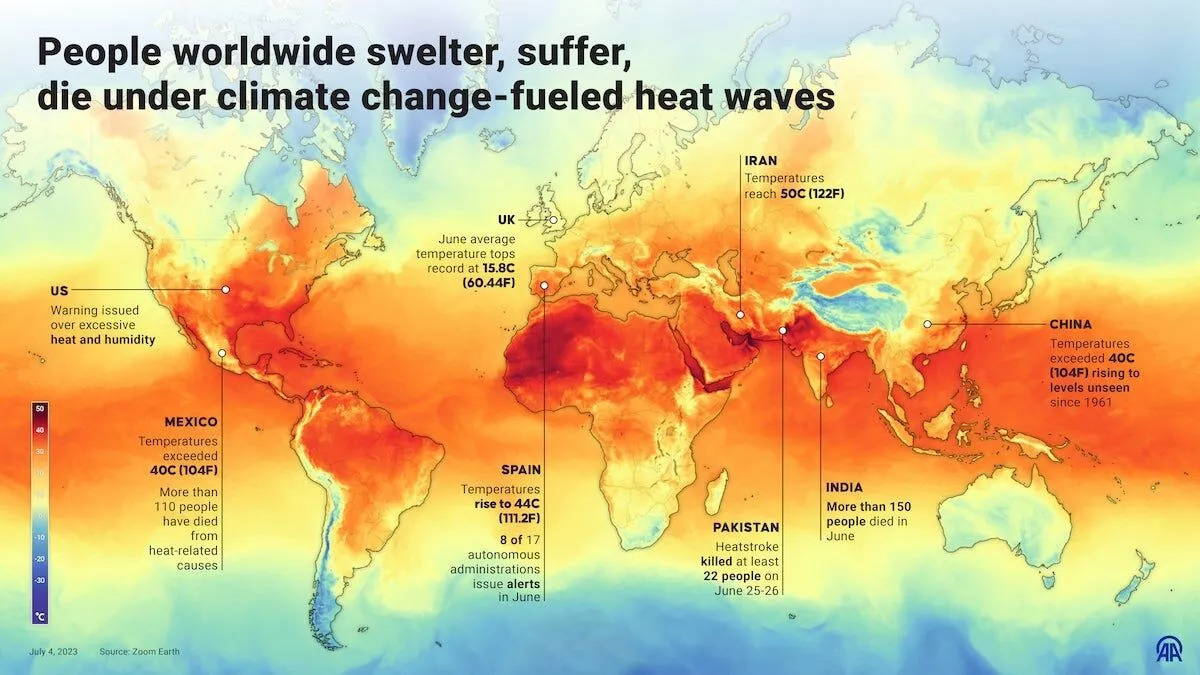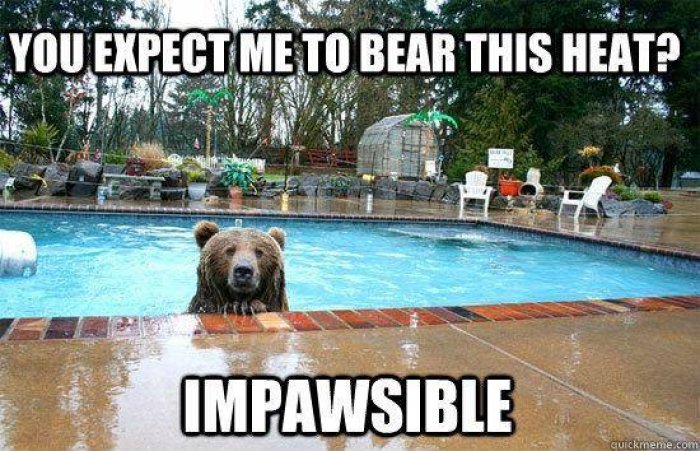The Science
Behind Heat Domes


Temperature
records have been breaking all over, as our Earth registers some of the
hottest periods ever measured. Correspondent David Pogue
explains how a "heat dome" has been driving up temperatures, and how
extreme heat is affecting residents of Phoenix, where there has been a
rise in hospital admissions for heat stress.
👇  👇
👇
 👇
👇
Climate change refers to long-term shifts in temperatures and weather patterns, mainly caused by human activities, especially the burning of fossil fuels.

Excellent work as always, David. I live in the northern Midwest where the temperature rarely goes above 100 F but we are seeing the impact of global warming in the form of stronger thunderstorms producing larger and more damaging hail. Earlier this year we got hail the size of a quarter and now I need a new roof. All the local car dealers are selling hail damaged cars at reduced prices. Outside of extremely rare tornadoes, we always considered ourselves safe from most natural disasters. Now we are seeing that nature can hit in a wide variety of ways.


#heatwaves #globalwarming
#climatechange @TheNatureConservancy @globalinstituteofsustainab9016
What Is Climate Change?
Climate change refers to long-term shifts in temperatures and weather patterns. Such shifts can be natural, due to changes in the sun’s activity or large volcanic eruptions. But since the 1800s, human activities have been the main driver of climate change, primarily due to the burning of fossil fuels like coal, oil and gas.
Burning fossil fuels generates greenhouse gas emissions that act like a blanket wrapped around the Earth, trapping the sun’s heat and raising temperatures.
The main greenhouse gases that are causing climate change include carbon dioxide and methane. These come from using gasoline for driving a car or coal for heating a building, for example. Clearing land and cutting down forests can also release carbon dioxide. Agriculture, oil and gas operations are major sources of methane emissions. Energy, industry, transport, buildings, agriculture and land use are among the main sectors causing greenhouse gases.
Climate change refers to long-term shifts in temperatures and weather patterns. Such shifts can be natural, due to changes in the sun’s activity or large volcanic eruptions. But since the 1800s, human activities have been the main driver of climate change, primarily due to the burning of fossil fuels like coal, oil and gas.
Burning fossil fuels generates greenhouse gas emissions that act like a blanket wrapped around the Earth, trapping the sun’s heat and raising temperatures.
The main greenhouse gases that are causing climate change include carbon dioxide and methane. These come from using gasoline for driving a car or coal for heating a building, for example. Clearing land and cutting down forests can also release carbon dioxide. Agriculture, oil and gas operations are major sources of methane emissions. Energy, industry, transport, buildings, agriculture and land use are among the main sectors causing greenhouse gases.
https://www.un.org/en/climatechange/what-is-climate-change


United Nations - Climate Action
العربية * 中文 * English * Français * Русский * Español
العربية * 中文 * English * Français * Русский * Español

Transcript
Politicians
may still debate it but it’s getting harder and harder to deny with
temperatures climbing to new heights everywhere something's going on out
there.
David Pogue takes us to Phoenix where the heat is on the last eight years have been the hottest years ever measured on the planet July was the hottest month ever recorded July 6 was the hottest day all over the planet the heat broke temperature records including in Siberia 103 degrees more than half the U.S population was subject to heat warnings in July here in Phoenix Arizona the heat has broken all kinds of records including the longest streak of consecutive days where the temperature hit 110 degrees or hotter really cooking today in Phoenix 118 degrees I think tomorrow will be even hotter and it's not just the hot air that's dangerous it's the surfaces this steering wheel 162.5 this sidewalk is 144 Fahrenheit that's hot enough to burn your dog's Paws in 60 seconds and this playground slide for children 182.8 degrees people say oh you live in Phoenix it's a dry heat and honestly 100 105 is not bad but I want to stress very strongly nobody is acclimated to 115 118 degrees more Troublesome is the fact that the low temperature Melissa Guardaro is an extreme heat researcher at Arizona State University have there been in Phoenix hospitals a rise in admissions absolutely the most number of Hospital admissions for heat stress that we've ever had what can you tell us about the ways your life changes during a heat wave like this so you don't work out Outdoors at 11 o'clock you go and you hike at five or six o'clock in the morning I actually have mittens in my car so that when the steering wheel gets really hot I put my mittens on and that's how I drive you know you're living in a hot place when you have to keep oven mitts in your glove compartment yeah compartment because [Laughter] so why has so much of the country been scorching for so long well allow me to introduce that breakout weather term of 2023 the heat Dome it's an area of high pressure way up high that traps the warm air like the lid on a pot it traps the heat it stops rain from moving in to cool us off and it just sits there unfortunately not every area under the heat Dome suffers equally you want to know who gets the worst of it cities are where heat comes to stay and comes to live Becca Benner is a director of climate issues at the nonprofit nature conservancy cities on average are several degrees warmer than the surrounding areas and just because of so much pavement it tends to absorb heat better and reflect heat better they call it the urban heat island effect too much pavement not enough trees and Greenery to cool things off the heat island effect is worse in the poorer areas of our cities where there aren't many trees and even the bus stops don't always offer shade Carlos Galves lives in Phoenix without air conditioning electricity or even running water the thermometer on his wall registers 109.
Are you able to sleep in this heat if I sleep for half an hour then I'll lie awake for an hour after that because it's just so hot do you have some tricks to stay cool in here I drink a lot of water and twice a day I pour a bucket of water on myself and I just try to rest in the evening in Phoenix you can get free transportation to the city's 90 cooling centers but ever since he collapsed from the Heat last month Galves is worried about leaving his house I'm afraid I could faint again if I go out during the day so I wait till the sun is going down to go out to get ice or water even for people who have air conditioning not everyone can afford to use it the average bill for AC in Phoenix is over $450 a month we have a group of people who have to make very difficult choices do I pay for air conditioning or do I pay for my rent this kind of heat wave is bringing up all the chinks in the infrastructure last month President Biden announced some small steps toward adapting to dangerous heat like expanding access to drinking water improving weather forecasts and setting up a heat alert system we should be protecting workers from hazardous conditions and we will but Guardaro maintains that there's much more to be done city planners should develop heat infrastructure like cooling centers and strategic Greenery and the federal government should start taking heat as seriously as it treats other climate disasters FEMA has never declared extreme heat as a disaster so flooding and hurricane all those things can be designated Federal disaster areas but not heat not Heat standing up more cooling centers providing greater services for people no that is not reimbursed by the government because there has never been a FEMA extreme heat declared disaster which climate crisis disaster kills the most people extreme heat is the climate disaster that kills the most people in fact it kills more people than all of the other disasters combined and we kind of have a joke here that we show a picture of before Heat Wave and then we show a picture after a heat wave and it's the same picture and that's part of the problem because people see tornadoes and houses are upended and hurricanes and trees and utility poles and it's this Invisible Killer so it sounds like heat among the various climate disasters does not get enough love from the media and the government it absolutely does not get enough love of course heat waves aren't the only result of the warming Planet heat also dries out vegetation and we get fires heat evaporates the land so we get droughts heat evaporates the oceans so we get hurricanes the nature conservancy's Becca Benner cautions us not to think of this Summer's heat as something freakish and rare it's the new normal it is no longer a future threat we are living this now so whether your basement just flooded whether you just had to evacuate for a fire whether it's too hot for you to go outside and enjoy yourself that means we are now experiencing some of the impacts of climate change we have to reduce emissions and we have to do it immediately and faster.
David Pogue takes us to Phoenix where the heat is on the last eight years have been the hottest years ever measured on the planet July was the hottest month ever recorded July 6 was the hottest day all over the planet the heat broke temperature records including in Siberia 103 degrees more than half the U.S population was subject to heat warnings in July here in Phoenix Arizona the heat has broken all kinds of records including the longest streak of consecutive days where the temperature hit 110 degrees or hotter really cooking today in Phoenix 118 degrees I think tomorrow will be even hotter and it's not just the hot air that's dangerous it's the surfaces this steering wheel 162.5 this sidewalk is 144 Fahrenheit that's hot enough to burn your dog's Paws in 60 seconds and this playground slide for children 182.8 degrees people say oh you live in Phoenix it's a dry heat and honestly 100 105 is not bad but I want to stress very strongly nobody is acclimated to 115 118 degrees more Troublesome is the fact that the low temperature Melissa Guardaro is an extreme heat researcher at Arizona State University have there been in Phoenix hospitals a rise in admissions absolutely the most number of Hospital admissions for heat stress that we've ever had what can you tell us about the ways your life changes during a heat wave like this so you don't work out Outdoors at 11 o'clock you go and you hike at five or six o'clock in the morning I actually have mittens in my car so that when the steering wheel gets really hot I put my mittens on and that's how I drive you know you're living in a hot place when you have to keep oven mitts in your glove compartment yeah compartment because [Laughter] so why has so much of the country been scorching for so long well allow me to introduce that breakout weather term of 2023 the heat Dome it's an area of high pressure way up high that traps the warm air like the lid on a pot it traps the heat it stops rain from moving in to cool us off and it just sits there unfortunately not every area under the heat Dome suffers equally you want to know who gets the worst of it cities are where heat comes to stay and comes to live Becca Benner is a director of climate issues at the nonprofit nature conservancy cities on average are several degrees warmer than the surrounding areas and just because of so much pavement it tends to absorb heat better and reflect heat better they call it the urban heat island effect too much pavement not enough trees and Greenery to cool things off the heat island effect is worse in the poorer areas of our cities where there aren't many trees and even the bus stops don't always offer shade Carlos Galves lives in Phoenix without air conditioning electricity or even running water the thermometer on his wall registers 109.
Are you able to sleep in this heat if I sleep for half an hour then I'll lie awake for an hour after that because it's just so hot do you have some tricks to stay cool in here I drink a lot of water and twice a day I pour a bucket of water on myself and I just try to rest in the evening in Phoenix you can get free transportation to the city's 90 cooling centers but ever since he collapsed from the Heat last month Galves is worried about leaving his house I'm afraid I could faint again if I go out during the day so I wait till the sun is going down to go out to get ice or water even for people who have air conditioning not everyone can afford to use it the average bill for AC in Phoenix is over $450 a month we have a group of people who have to make very difficult choices do I pay for air conditioning or do I pay for my rent this kind of heat wave is bringing up all the chinks in the infrastructure last month President Biden announced some small steps toward adapting to dangerous heat like expanding access to drinking water improving weather forecasts and setting up a heat alert system we should be protecting workers from hazardous conditions and we will but Guardaro maintains that there's much more to be done city planners should develop heat infrastructure like cooling centers and strategic Greenery and the federal government should start taking heat as seriously as it treats other climate disasters FEMA has never declared extreme heat as a disaster so flooding and hurricane all those things can be designated Federal disaster areas but not heat not Heat standing up more cooling centers providing greater services for people no that is not reimbursed by the government because there has never been a FEMA extreme heat declared disaster which climate crisis disaster kills the most people extreme heat is the climate disaster that kills the most people in fact it kills more people than all of the other disasters combined and we kind of have a joke here that we show a picture of before Heat Wave and then we show a picture after a heat wave and it's the same picture and that's part of the problem because people see tornadoes and houses are upended and hurricanes and trees and utility poles and it's this Invisible Killer so it sounds like heat among the various climate disasters does not get enough love from the media and the government it absolutely does not get enough love of course heat waves aren't the only result of the warming Planet heat also dries out vegetation and we get fires heat evaporates the land so we get droughts heat evaporates the oceans so we get hurricanes the nature conservancy's Becca Benner cautions us not to think of this Summer's heat as something freakish and rare it's the new normal it is no longer a future threat we are living this now so whether your basement just flooded whether you just had to evacuate for a fire whether it's too hot for you to go outside and enjoy yourself that means we are now experiencing some of the impacts of climate change we have to reduce emissions and we have to do it immediately and faster.
Subscribe to the "CBS Sunday Morning" YouTube channel: http://bit.ly/20gXwJT
Get more of "CBS Sunday Morning": http://cbsn.ws/1PlMmAz
Follow "CBS Sunday Morning" on Instagram: http://bit.ly/23XunIh
Like "CBS Sunday Morning" on Facebook: https://bit.ly/3sRgLPG
Follow "CBS Sunday Morning" on Twitter: http://bit.ly/1RquoQb
Subscribe to our newsletter: http://cbsn.ws/1RqHw7T
Download the CBS News app: http://cbsn.ws/1Xb1WC8
Try Paramount+ free: https://bit.ly/2OiW1kZ



.gif)
No comments:
Post a Comment